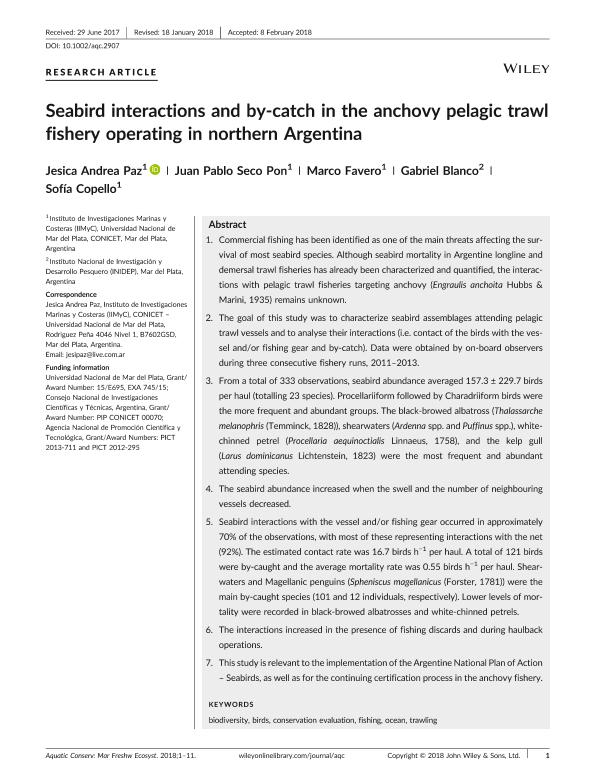Mostrar el registro sencillo del ítem
dc.contributor.author
Paz, Jesica Andrea

dc.contributor.author
Seco Pon, Juan Pablo

dc.contributor.author
Favero, Marco

dc.contributor.author
Blanco, Gabriel

dc.contributor.author
Copello, Sofía

dc.date.available
2019-11-26T19:14:49Z
dc.date.issued
2018-05-14
dc.identifier.citation
Paz, Jesica Andrea; Seco Pon, Juan Pablo; Favero, Marco; Blanco, Gabriel; Copello, Sofía; Seabird interactions and by-catch in the anchovy pelagic trawl fishery operating in northern Argentina; John Wiley & Sons Ltd; Aquatic Conservation: Marine and Freshwater Ecosystems; 28; 4; 14-5-2018; 850-860
dc.identifier.issn
1052-7613
dc.identifier.uri
http://hdl.handle.net/11336/90550
dc.description.abstract
Commercial fishing has been identified as one of the main threats affecting the survival of most seabird species. Although seabird mortality in Argentine longline and demersal trawl fisheries has already been characterized and quantified, the interactions with pelagic trawl fisheries targeting anchovy (Engraulis anchoita Hubbs & Marini, 1935) remains unknown. The goal of this study was to characterize seabird assemblages attending pelagic trawl vessels and to analyse their interactions (i.e. contact of the birds with the vessel and/or fishing gear and by-catch). Data were obtained by on-board observers during three consecutive fishery runs, 2011–2013. From a total of 333 observations, seabird abundance averaged 157.3 ± 229.7 birds per haul (totalling 23 species). Procellariiform followed by Charadriiform birds were the more frequent and abundant groups. The black-browed albatross (Thalassarche melanophris (Temminck, 1828)), shearwaters (Ardenna spp. and Puffinus spp.), white-chinned petrel (Procellaria aequinoctialis Linnaeus, 1758), and the kelp gull (Larus dominicanus Lichtenstein, 1823) were the most frequent and abundant attending species. The seabird abundance increased when the swell and the number of neighbouring vessels decreased. Seabird interactions with the vessel and/or fishing gear occurred in approximately 70% of the observations, with most of these representing interactions with the net (92%). The estimated contact rate was 16.7 birds h−1 per haul. A total of 121 birds were by-caught and the average mortality rate was 0.55 birds h−1 per haul. Shearwaters and Magellanic penguins (Spheniscus magellanicus (Forster, 1781)) were the main by-caught species (101 and 12 individuals, respectively). Lower levels of mortality were recorded in black-browed albatrosses and white-chinned petrels. The interactions increased in the presence of fishing discards and during haulback operations. This study is relevant to the implementation of the Argentine National Plan of Action – Seabirds, as well as for the continuing certification process in the anchovy fishery.
dc.format
application/pdf
dc.language.iso
eng
dc.publisher
John Wiley & Sons Ltd

dc.rights
info:eu-repo/semantics/openAccess
dc.rights.uri
https://creativecommons.org/licenses/by-nc-sa/2.5/ar/
dc.subject
BIODIVERSITY
dc.subject
BIRDS
dc.subject
CONSERVATION EVALUATION
dc.subject
FISHING
dc.subject.classification
Conservación de la Biodiversidad

dc.subject.classification
Ciencias Biológicas

dc.subject.classification
CIENCIAS NATURALES Y EXACTAS

dc.title
Seabird interactions and by-catch in the anchovy pelagic trawl fishery operating in northern Argentina
dc.type
info:eu-repo/semantics/article
dc.type
info:ar-repo/semantics/artículo
dc.type
info:eu-repo/semantics/publishedVersion
dc.date.updated
2019-10-24T19:35:00Z
dc.identifier.eissn
1099-0755
dc.journal.volume
28
dc.journal.number
4
dc.journal.pagination
850-860
dc.journal.pais
Reino Unido

dc.description.fil
Fil: Paz, Jesica Andrea. Consejo Nacional de Investigaciones Científicas y Técnicas. Centro Científico Tecnológico Conicet - Mar del Plata. Instituto de Investigaciones Marinas y Costeras. Universidad Nacional de Mar del Plata. Facultad de Ciencias Exactas y Naturales. Instituto de Investigaciones Marinas y Costeras; Argentina
dc.description.fil
Fil: Seco Pon, Juan Pablo. Consejo Nacional de Investigaciones Científicas y Técnicas. Centro Científico Tecnológico Conicet - Mar del Plata. Instituto de Investigaciones Marinas y Costeras. Universidad Nacional de Mar del Plata. Facultad de Ciencias Exactas y Naturales. Instituto de Investigaciones Marinas y Costeras; Argentina
dc.description.fil
Fil: Favero, Marco. Consejo Nacional de Investigaciones Científicas y Técnicas. Centro Científico Tecnológico Conicet - Mar del Plata. Instituto de Investigaciones Marinas y Costeras. Universidad Nacional de Mar del Plata. Facultad de Ciencias Exactas y Naturales. Instituto de Investigaciones Marinas y Costeras; Argentina
dc.description.fil
Fil: Blanco, Gabriel. Instituto Nacional de Investigaciones y Desarrollo Pesquero; Argentina
dc.description.fil
Fil: Copello, Sofía. Consejo Nacional de Investigaciones Científicas y Técnicas. Centro Científico Tecnológico Conicet - Mar del Plata. Instituto de Investigaciones Marinas y Costeras. Universidad Nacional de Mar del Plata. Facultad de Ciencias Exactas y Naturales. Instituto de Investigaciones Marinas y Costeras; Argentina
dc.journal.title
Aquatic Conservation: Marine and Freshwater Ecosystems

dc.relation.alternativeid
info:eu-repo/semantics/altIdentifier/doi/http://dx.doi.org/10.1002/aqc.2907
dc.relation.alternativeid
info:eu-repo/semantics/altIdentifier/url/https://onlinelibrary.wiley.com/doi/full/10.1002/aqc.2907
Archivos asociados
